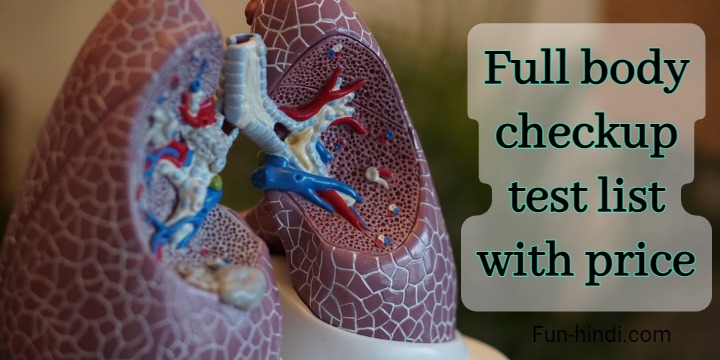Today in this post i will share information about “Full body checkup test list with price.” 🏥👨⚕️👩⚕️🧑⚕️💉🩺
What is full body checkup test
A full body checkup test is a comprehensive health assessment that evaluates the overall health of an individual.
This checkup typically includes a series of medical tests and physical examinations that assess various aspects of your health, including cardiovascular health, kidney function, liver function, thyroid function, and overall blood count.
The tests included in a full-body checkup may vary depending on the individual’s age, sex, medical history, and lifestyle factors such as smoking, alcohol consumption, or sedentary lifestyle.
Typically, a full-body checkup includes a blood test, urine test, and imaging tests like chest X-ray, ultrasound, or CT scan.
Additionally, the doctor may conduct a physical exam to check for any abnormality or symptoms in various organs and systems of the body.
A full-body checkup is usually recommended for people with a family history of chronic diseases, a sedentary lifestyle, or those above a certain age.
It is an effective way to detect any underlying health conditions early and prevent their progression through early intervention and lifestyle changes.
Full body checkup test list with price
The cost of a full-body checkup can vary depending on the location and the specific tests included in the package. However, here is a list of some common tests that are usually included in a full-body checkup:
Complete Blood Count (CBC) – $20-$50
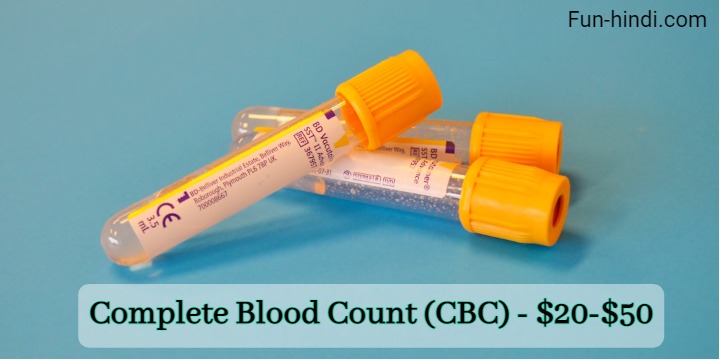
A Complete Blood Count (CBC) is a common blood test that measures different components of your blood. The CBC provides information about your overall health and can help diagnose a variety of conditions such as infections, anemia, and leukemia. A CBC typically includes the following measurements:
- Red Blood Cells (RBCs): RBCs are responsible for carrying oxygen throughout the body. A CBC will measure the number of RBCs in your blood, as well as the amount of hemoglobin (the protein in RBCs that carries oxygen) and hematocrit (the percentage of blood that is made up of RBCs).
- White Blood Cells (WBCs): WBCs are part of your body’s immune system and help fight infections. A CBC will measure the number of WBCs in your blood.
- Platelets: Platelets are small cells that help your blood clot. A CBC will measure the number of platelets in your blood.
- Mean Corpuscular Volume (MCV): MCV measures the average size of your RBCs. This measurement can help diagnose certain types of anemia.
- Mean Corpuscular Hemoglobin (MCH): MCH measures the amount of hemoglobin in your RBCs. This measurement can help diagnose certain types of anemia.
- Mean Corpuscular Hemoglobin Concentration (MCHC): MCHC measures the concentration of hemoglobin in your RBCs. This measurement can help diagnose certain types of anemia.
- Red Cell Distribution Width (RDW): RDW measures the variation in size of your RBCs. This measurement can help diagnose certain types of anemia.
Your CBC results will be compared to a reference range, which is a set of values that is considered normal for your age and sex. If your results are outside of the reference range, it may indicate a health problem that requires further testing or treatment.
It’s important to discuss your CBC results with your healthcare provider to fully understand what they mean and what steps you should take next.
| ✅ Read Also: Health Benefits and Side Effects of Olive Oil |
Fasting Blood Sugar (FBS) – $10-$25
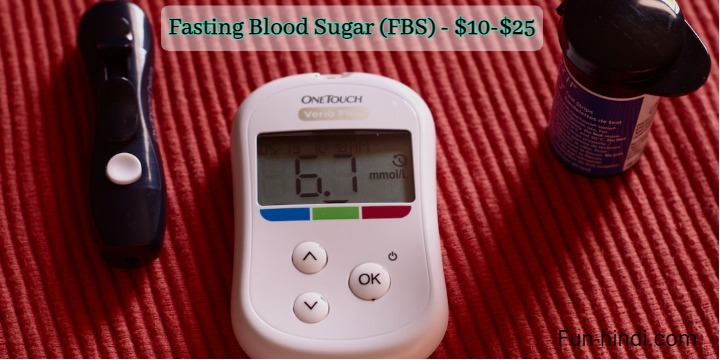
Fasting blood sugar (FBS) is a blood test that measures the amount of glucose in your blood after you have fasted for a certain amount of time, usually overnight. This test is used to diagnose and monitor diabetes and other conditions related to high blood sugar levels.
Here is some full information about FBS:
- Preparation: For an accurate FBS result, you will need to fast for at least 8 hours before the test. You should not eat or drink anything except water during this fasting period.
- Test procedure: A healthcare provider will draw a sample of your blood, usually from a vein in your arm. The sample will be sent to a laboratory for analysis.
- Normal range: The normal range for fasting blood sugar levels is typically between 70 and 99 milligrams per deciliter (mg/dL). However, this range may vary slightly depending on the laboratory that performs the test.
- High blood sugar levels: If your FBS level is above 126 mg/dL on two separate occasions, it may indicate diabetes. If your FBS level is between 100 and 125 mg/dL, it may indicate prediabetes, which means you are at risk of developing diabetes.
- Low blood sugar levels: If your FBS level is below 70 mg/dL, it may indicate hypoglycemia, which is a condition in which your blood sugar level is too low.
- Other factors: Several factors can affect your FBS level, including medications, stress, illness, and physical activity. Your healthcare provider may recommend additional tests or follow-up appointments to determine the cause of abnormal FBS results.
- Monitoring: If you have diabetes or prediabetes, your healthcare provider may recommend regular FBS testing to monitor your blood sugar levels and adjust your treatment plan if necessary.
It’s important to discuss your FBS results with your healthcare provider to fully understand what they mean and what steps you should take next.
| ✅ Read Also: Health Benefits of Lentils In English |
Lipid Profile – $30-$60
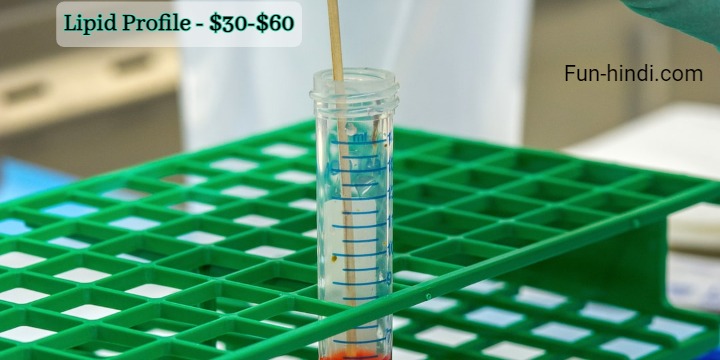
A lipid profile is a blood test that measures the levels of different types of lipids, or fats, in your blood. Lipids are an important part of your body’s structure and function, but abnormal levels can increase your risk for heart disease and other health problems. Here is some full information about lipid profile:
- Preparation: To prepare for a lipid profile test, you may need to fast for 9-12 hours before the test. Your healthcare provider will give you specific instructions about what to eat or drink before the test.
- Test procedure: A healthcare provider will draw a sample of your blood, usually from a vein in your arm. The sample will be sent to a laboratory for analysis.
- Components: A lipid profile typically includes the following measurements:
- Total cholesterol: This measures the total amount of cholesterol in your blood, including LDL, HDL, and other types of cholesterol.
- LDL cholesterol: This measures the amount of “bad” cholesterol in your blood that can contribute to plaque buildup in your arteries.
- HDL cholesterol: This measures the amount of “good” cholesterol in your blood that helps remove LDL cholesterol from your arteries.
- Triglycerides: This measures the amount of another type of fat in your blood that can contribute to plaque buildup in your arteries.
- Normal range: The normal range for each component of the lipid profile may vary slightly depending on your age, sex, and other factors. Generally, healthy total cholesterol levels are less than 200 mg/dL, LDL cholesterol levels are less than 100 mg/dL, HDL cholesterol levels are greater than 60 mg/dL, and triglyceride levels are less than 150 mg/dL.
- High levels: High levels of total cholesterol, LDL cholesterol, or triglycerides, and low levels of HDL cholesterol may increase your risk of heart disease and other health problems.
- Monitoring: If you have abnormal lipid profile results, your healthcare provider may recommend lifestyle changes, such as eating a healthy diet, exercising regularly, and quitting smoking, or medications to help lower your lipid levels.
It’s important to discuss your lipid profile results with your healthcare provider to fully understand what they mean and what steps you should take next.
Liver Function Test (LFT) – $30-$50
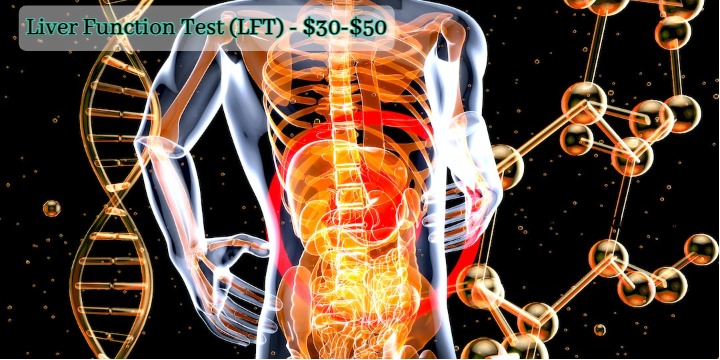
Liver function tests (LFTs) are blood tests that measure the levels of different enzymes and proteins produced by your liver. These tests can help diagnose liver disease and monitor liver function. Here is some full information about LFTs:
- Preparation: There is typically no special preparation needed for an LFT. However, your healthcare provider may give you specific instructions about what to eat or drink before the test.
- Test procedure: A healthcare provider will draw a sample of your blood, usually from a vein in your arm. The sample will be sent to a laboratory for analysis.
- Components: A liver function test typically includes the following measurements:
- Alanine aminotransferase (ALT): This measures the level of an enzyme produced by liver cells. High levels of ALT may indicate liver damage or disease.
- Aspartate aminotransferase (AST): This measures the level of an enzyme produced by liver cells and other organs. High levels of AST may indicate liver damage or disease.
- Alkaline phosphatase (ALP): This measures the level of an enzyme produced by liver cells and other tissues. High levels of ALP may indicate liver or bone disease.
- Total bilirubin: This measures the level of a waste product produced when red blood cells are broken down. High levels of bilirubin may indicate liver disease or other health problems.
- Albumin: This measures the level of a protein produced by the liver. Low levels of albumin may indicate liver disease or other health problems.
- Normal range: The normal range for each component of the LFT may vary slightly depending on the laboratory that performs the test. Generally, healthy ALT levels are less than 45 units per liter (U/L) for men and less than 35 U/L for women, healthy AST levels are less than 40 U/L for men and less than 35 U/L for women, healthy ALP levels are less than 130 U/L, healthy total bilirubin levels are less than 1.2 mg/dL, and healthy albumin levels are between 3.5 and 5.0 grams per deciliter (g/dL).
- High levels: High levels of any component of the LFT may indicate liver disease or other health problems, including viral hepatitis, alcohol-related liver disease, autoimmune liver disease, or liver cancer.
- Monitoring: If you have abnormal LFT results, your healthcare provider may recommend additional tests or follow-up appointments to determine the cause of the abnormal results and develop a treatment plan if necessary.
It’s important to discuss your LFT results with your healthcare provider to fully understand what they mean and what steps you should take next.
| ✅ Read Also: Health benefits of Kiwi fruit In English |
Kidney Function Test (KFT) – $30-$50

Kidney function tests (KFTs) are a group of blood and urine tests that measure the levels of different substances produced by your kidneys. These tests can help diagnose kidney disease and monitor kidney function. Here is some full information about KFTs:
- Preparation: There is typically no special preparation needed for a KFT. However, your healthcare provider may give you specific instructions about what to eat or drink before the test.
- Test procedure: A healthcare provider will draw a sample of your blood, usually from a vein in your arm. The sample will be sent to a laboratory for analysis. In addition to blood tests, KFTs may also include urine tests, where you will be asked to provide a urine sample.
- Components: A kidney function test typically includes the following measurements:
- Blood urea nitrogen (BUN): This measures the level of a waste product produced by your liver and excreted by your kidneys. High levels of BUN may indicate kidney dysfunction or disease.
- Creatinine: This measures the level of a waste product produced by your muscles and excreted by your kidneys. High levels of creatinine may indicate kidney dysfunction or disease.
- Glomerular filtration rate (GFR): This measures the amount of blood that is filtered by your kidneys each minute. A low GFR may indicate kidney dysfunction or disease.
- Urinalysis: This measures the levels of different substances, such as protein and glucose, in your urine. High levels of protein in your urine may indicate kidney dysfunction or disease.
- Normal range: The normal range for each component of the KFT may vary slightly depending on your age, sex, and other factors. Generally, healthy BUN levels are between 7 and 20 milligrams per deciliter (mg/dL), healthy creatinine levels are between 0.7 and 1.3 mg/dL for men and between 0.6 and 1.1 mg/dL for women, healthy GFR levels are above 60 milliliters per minute per 1.73 meters squared, and healthy urine should not contain significant amounts of protein.
- High levels: High levels of any component of the KFT may indicate kidney dysfunction or disease, including chronic kidney disease, acute kidney injury, or other health problems.
- Monitoring: If you have abnormal KFT results, your healthcare provider may recommend additional tests or follow-up appointments to determine the cause of the abnormal results and develop a treatment plan if necessary.
It’s important to discuss your KFT results with your healthcare provider to fully understand what they mean and what steps you should take next.
Thyroid Function Test (TFT) – $30-$50
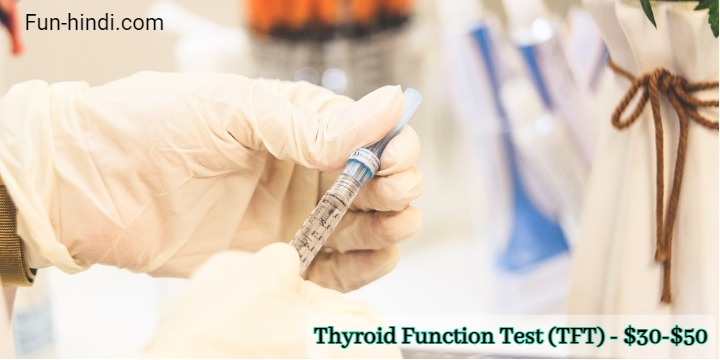
Thyroid function tests (TFTs) are a group of blood tests that measure the levels of different hormones produced by your thyroid gland. These tests can help diagnose thyroid disorders and monitor thyroid function. Here is some full information about TFTs:
- Preparation: There is typically no special preparation needed for a TFT. However, your healthcare provider may give you specific instructions about what to eat or drink before the test.
- Test procedure: A healthcare provider will draw a sample of your blood, usually from a vein in your arm. The sample will be sent to a laboratory for analysis.
- Components: A thyroid function test typically includes the following measurements:
- Thyroid-stimulating hormone (TSH): This measures the level of a hormone produced by your pituitary gland that stimulates your thyroid gland to produce hormones. High levels of TSH may indicate an underactive thyroid (hypothyroidism), while low levels of TSH may indicate an overactive thyroid (hyperthyroidism).
- Free thyroxine (FT4): This measures the level of a hormone produced by your thyroid gland that regulates metabolism. High levels of FT4 may indicate hyperthyroidism, while low levels of FT4 may indicate hypothyroidism.
- Total triiodothyronine (T3): This measures the level of a hormone produced by your thyroid gland that also regulates metabolism. High levels of T3 may indicate hyperthyroidism, while low levels of T3 may indicate hypothyroidism.
- Normal range: The normal range for each component of the TFT may vary slightly depending on the laboratory that performs the test. Generally, healthy TSH levels are between 0.4 and 4.0 milli-international units per liter (mIU/L), healthy FT4 levels are between 0.8 and 1.8 nanograms per deciliter (ng/dL), and healthy T3 levels are between 80 and 200 nanograms per deciliter (ng/dL).
- High levels: High levels of TSH may indicate hypothyroidism, while high levels of FT4 and T3 may indicate hyperthyroidism.
- Monitoring: If you have abnormal TFT results, your healthcare provider may recommend additional tests or follow-up appointments to determine the cause of the abnormal results and develop a treatment plan if necessary.
It’s important to discuss your TFT results with your healthcare provider to fully understand what they mean and what steps you should take next.
| ✅ Read Also: Health benefits of Blueberry fruit In English |
Electrolyte panel – $20-$40

An electrolyte panel test is a blood test that measures the levels of various electrolytes in your body. Electrolytes are minerals in your blood and other body fluids that help regulate important bodily functions, such as nerve and muscle function, blood pH balance, and hydration levels. Here is some full information about the electrolyte panel test:
- Preparation: There is typically no special preparation needed for an electrolyte panel test. However, your healthcare provider may give you specific instructions about what to eat or drink before the test.
- Test procedure: A healthcare provider will draw a sample of your blood, usually from a vein in your arm. The sample will be sent to a laboratory for analysis.
- Components: An electrolyte panel test typically includes measurements of the following electrolytes:
- Sodium (Na+): This is an important electrolyte that helps regulate blood pressure and fluid balance in your body. Abnormal sodium levels can cause dehydration, high blood pressure, and other health problems.
- Potassium (K+): This is an important electrolyte that helps regulate muscle and nerve function, heart rhythm, and fluid balance in your body. Abnormal potassium levels can cause muscle weakness, irregular heartbeat, and other health problems.
- Chloride (Cl-): This is an important electrolyte that helps regulate fluid balance and maintain proper blood pH levels in your body. Abnormal chloride levels can cause dehydration, metabolic acidosis, and other health problems.
- Bicarbonate (HCO3-): This is an important electrolyte that helps regulate blood pH levels and maintain proper acid-base balance in your body. Abnormal bicarbonate levels can indicate a variety of health problems, including kidney disease, lung disease, and metabolic acidosis.
- Normal range: The normal range for each component of the electrolyte panel test may vary slightly depending on the laboratory that performs the test. Generally, healthy sodium levels are between 135 and 145 milliequivalents per liter (mEq/L), healthy potassium levels are between 3.5 and 5.0 mEq/L, healthy chloride levels are between 96 and 106 mEq/L, and healthy bicarbonate levels are between 22 and 28 mEq/L.
- High or low levels: Abnormal levels of any electrolyte can indicate an underlying health problem, such as kidney disease, heart disease, or hormonal imbalances. High or low levels of specific electrolytes can also cause a range of symptoms, such as muscle weakness, nausea, confusion, seizures, and cardiac arrhythmias.
- Monitoring: If you have abnormal electrolyte levels, your healthcare provider may recommend additional tests or follow-up appointments to determine the cause of the abnormal results and develop a treatment plan if necessary.
It’s important to discuss your electrolyte panel test results with your healthcare provider to fully understand what they mean and what steps you should take next.
Urine analysis – $10-$25
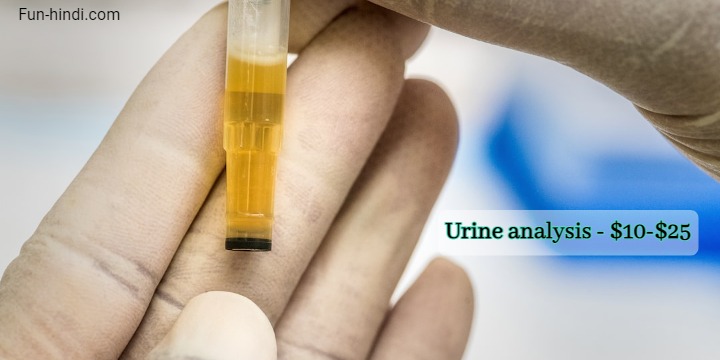
A urine analysis test is a diagnostic test that evaluates the urine to detect various abnormalities that can provide information about an individual’s health status. Here is some full information about the urine analysis test:
- Preparation: Usually, no special preparation is required for a urine analysis test. However, it’s recommended to collect the first-morning urine sample as it is the most concentrated urine of the day.
- Test procedure: The test requires a small amount of urine sample. The individual is provided with a sterile container to collect the urine sample. Once the urine is collected, the container is labeled with the individual’s name and other pertinent information and sent to a laboratory for analysis.
- Components: The urine analysis test usually evaluates the following components of the urine:
- Color and appearance: The color and appearance of urine can provide information about hydration status, diet, and health conditions. Normally, urine is pale yellow in color and clear in appearance.
- pH: pH is a measure of the acidity or alkalinity of urine. Normal urine pH ranges from 4.5 to 8.0.
- Specific gravity: Specific gravity measures the concentration of dissolved substances in urine. It can indicate the hydration status of an individual. The normal range for specific gravity is 1.005 to 1.030.
- Protein: Protein in urine can indicate kidney disease, diabetes, or other health conditions. Normally, urine should not contain protein.
- Glucose: Glucose in urine can indicate diabetes or other health conditions. Normally, urine should not contain glucose.
- Ketones: Ketones in urine can indicate diabetes or other health conditions. Normally, urine should not contain ketones.
- Bilirubin: Bilirubin in urine can indicate liver disease or other health conditions. Normally, urine should not contain bilirubin.
- Urobilinogen: Urobilinogen is a substance produced by the liver that is excreted in urine. Abnormal levels of urobilinogen in urine can indicate liver disease or other health conditions.
- Red blood cells: Red blood cells in urine can indicate kidney disease, bladder infections, or other health conditions. Normally, urine should not contain red blood cells.
- White blood cells: White blood cells in urine can indicate bladder infections or other health conditions. Normally, urine should not contain white blood cells.
- Bacteria: Bacteria in urine can indicate bladder infections or other health conditions. Normally, urine should not contain bacteria.
- Normal range: The normal range for each component of the urine analysis test may vary slightly depending on the laboratory that performs the test.
- High or low levels: Abnormal levels of any component in urine can indicate an underlying health problem, such as kidney disease, liver disease, diabetes, or bladder infections.
- Monitoring: If you have abnormal urine analysis test results, your healthcare provider may recommend additional tests or follow-up appointments to determine the cause of the abnormal results and develop a treatment plan if necessary.
It’s important to discuss your urine analysis test results with your healthcare provider to fully understand what they mean and what steps you should take next.
| ✅ Read Also: Coconut water health benefits and side-effects |
Chest X-ray – $30-$80

A chest X-ray is a diagnostic imaging test that uses electromagnetic radiation to create images of the chest area. Here’s some full information about the chest X-ray test:
- Preparation: Usually, no special preparation is required for a chest X-ray. However, you may need to remove any metal objects, such as jewelry, from your chest area before the test.
- Test procedure: The chest X-ray test is usually performed in a hospital or diagnostic imaging center. During the test, you will be asked to stand in front of a special X-ray machine or lie down on a table while the machine takes images of your chest area.
- Components: The chest X-ray test evaluates the following components of the chest area:
- Lungs: The chest X-ray can detect abnormalities, such as fluid, tumors, or infections in the lungs.
- Heart: The chest X-ray can detect the size and shape of the heart and any abnormalities, such as fluid around the heart.
- Bones: The chest X-ray can detect any bone abnormalities, such as fractures or arthritis.
- Normal range: A normal chest X-ray will show clear lung fields, normal heart size and shape, and no abnormalities in the bones.
- High or low levels: Abnormal chest X-ray results can indicate various health problems, such as lung infections, fluid around the lungs, heart failure, lung cancer, or bone abnormalities.
- Monitoring: If you have abnormal chest X-ray results, your healthcare provider may recommend additional tests or follow-up appointments to determine the cause of the abnormal results and develop a treatment plan if necessary.
It’s important to discuss your chest X-ray results with your healthcare provider to fully understand what they mean and what steps you should take next.
| ✅ Read Also: Sugarcane Juice Health benefits and Side-effects |
ECG (Electrocardiogram) – $30-$50
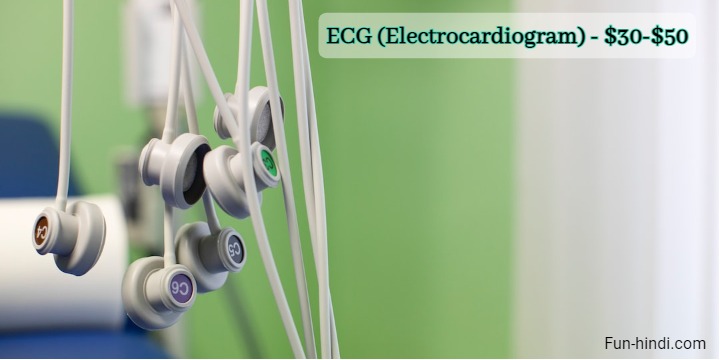
An electrocardiogram (ECG) is a non-invasive test that evaluates the electrical activity of the heart. Here’s some full information about the ECG test:
- Preparation: Usually, no special preparation is required for an ECG test. However, you may be asked to avoid applying any lotion or cream to your chest area on the day of the test.
- Test procedure: The ECG test is usually performed in a hospital or doctor’s office. During the test, you will be asked to lie down on a table while several small electrodes are attached to your chest, arms, and legs. The electrodes are connected to an ECG machine, which records the electrical activity of your heart.
- Components: The ECG test evaluates the following components of the heart’s electrical activity:
- Heart rate: The ECG test can measure the heart rate, which is the number of times the heart beats per minute.
- Heart rhythm: The ECG test can detect any irregularities in the heart rhythm, such as atrial fibrillation or ventricular tachycardia.
- Heart conduction: The ECG test can detect any problems with the conduction system of the heart, such as a blockage in the electrical pathway.
- Heart size and function: The ECG test can provide information about the size and function of the heart, including any enlargement or damage.
- Normal range: A normal ECG will show a regular heart rhythm, normal heart rate, and no abnormalities in the heart’s electrical activity.
- High or low levels: Abnormal ECG results can indicate various heart problems, such as arrhythmias, heart blockage, myocardial infarction (heart attack), or heart disease.
- Monitoring: If you have abnormal ECG results, your healthcare provider may recommend additional tests or follow-up appointments to determine the cause of the abnormal results and develop a treatment plan if necessary.
It’s important to discuss your ECG results with your healthcare provider to fully understand what they mean and what steps you should take next.
| ✅ Read Also: Health and fitness guide Top 30 |
Ultrasonography of abdomen – $50-$150

Abdominal ultrasonography is a non-invasive diagnostic imaging test that uses sound waves to create images of the organs and structures within the abdomen. Here’s some full information about the ultrasonography of abdomen test:
- Preparation: You may be asked to fast for a certain period before the test, usually for at least 6-8 hours. You may also be asked to drink water or a special liquid to fill your bladder, which can help improve the quality of the images.
- Test procedure: The abdominal ultrasonography test is usually performed in a hospital or diagnostic imaging center. During the test, you will lie down on a table while a technician applies a special gel to your abdomen. The technician then uses a small device called a transducer to emit sound waves and capture images of your abdomen.
- Components: The abdominal ultrasonography test evaluates the following components of the abdomen:
- Liver: The ultrasonography can detect any abnormalities in the liver, such as liver disease, cysts, or tumors.
- Gallbladder: The ultrasonography can detect any gallbladder problems, such as gallstones or inflammation.
- Pancreas: The ultrasonography can detect any pancreatic abnormalities, such as pancreatitis or tumors.
- Spleen: The ultrasonography can detect any spleen problems, such as enlargement or injury.
- Kidneys: The ultrasonography can detect any kidney abnormalities, such as kidney stones, cysts, or tumors.
- Bladder: The ultrasonography can detect any bladder problems, such as inflammation or tumors.
- Normal range: A normal abdominal ultrasonography will show clear images of the organs and structures within the abdomen, with no signs of abnormalities.
- High or low levels: Abnormal abdominal ultrasonography results can indicate various health problems, such as liver disease, gallstones, kidney stones, tumors, or cysts.
- Monitoring: If you have abnormal abdominal ultrasonography results, your healthcare provider may recommend additional tests or follow-up appointments to determine the cause of the abnormal results and develop a treatment plan if necessary.
It’s important to discuss your abdominal ultrasonography results with your healthcare provider to fully understand what they mean and what steps you should take next.
conclusion
The total cost of a full-body checkup can range from $250 to $500 depending on the location and the specific tests included in the package.
Note: Please note that these prices are estimates and may vary depending on the healthcare facility you choose. It’s always best to consult with a healthcare professional for a tailored check-up based on your individual needs.
| ✅ Read Also: Sex knowledge (2100+ Sex facts) |
FAQs: Full body checkup test
Here are some short FAQs about a full body checkup test:
What is a full body checkup test?
A full body checkup test is a comprehensive medical examination that evaluates the overall health and wellbeing of an individual.
It typically involves several medical tests and screenings, including blood tests, imaging tests, and physical exams.
What tests are included in a full body checkup test?
The tests included in a full body checkup test can vary depending on the individual’s age, gender, and medical history.
However, some of the most common tests include a complete blood count (CBC), lipid profile, liver function test (LFT), kidney function test (KFT), thyroid function test (TFT), electrocardiogram (ECG), and chest X-ray.
Why is a full body checkup test important?
A full body checkup test can help detect any underlying health problems or risk factors for diseases, even before symptoms appear.
This can enable early detection and treatment, which can improve the chances of successful treatment and prevent complications.
Who should get a full body checkup test?
A full body checkup test can be beneficial for anyone, but it is particularly recommended for individuals with a family history of certain diseases or risk factors, such as diabetes, heart disease, or cancer.
It is also recommended for individuals over the age of 40, as the risk of developing certain health problems increases with age.
How often should a full body checkup test be done?
The frequency of a full body checkup test can vary depending on the individual’s age, gender, and medical history.
Generally, it is recommended to have a full body checkup test at least once a year or as recommended by your healthcare provider. However, some tests may need to be done more frequently, such as blood sugar tests for individuals with diabetes.

